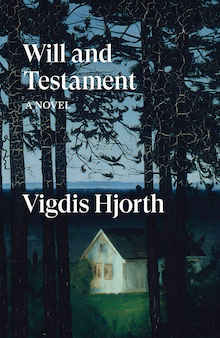“Will and Testament” by Vigdis Hjorth [Why This Book Should Win]
Check in daily for new Why This Book Should Win posts covering all thirty-five titles longlisted for the 2020 Best Translated Book Awards.
Elisa Wouk Almino is a Los Angeles-based writer and literary translator from Portuguese. She is the translator of This House(Scrambler Books, 2017), a collection of poetry by Ana Martins Marques. She is currently a senior editor at Hyperallergic and is the editor of Alice Trumbull Mason: Pioneer of American Abstraction(Rizzoli, May 2020). She teaches at Catapult and UCLA Extension.

Will and Testament by Vigdis Hjorth, translated from the Norwegian by Charlotte Barslund (Verso)
It’s not uncommon for women writers and artists to be discussed in terms of their personal lives. Their image becomes as much a fascination, if not at times more, than the work they produce (think of Clarice Lispector, Frida Kahlo). This is what I think about when I look up the English-language articles on two books that made it on to this year’s BTBA longlist: Will and Testament by Vigdis Hjorth (translated from Norwegian by Charlotte Barslund, published by Verso) and Welcome to America by Linda Boström Knausgård (translated from Swedish by Martin Aitken, published by World Editions).
I read both books without knowing anything about them or their authors. I was completely gripped by Will and Testament, a story narrated by a woman who was sexually abused by her father as a child. Estranged from her parents and siblings, she must face them as an older adult to discuss the heated terms of the family inheritance. Welcome to America likewise drew me in with its moving story about a young girl who stops talking after her father dies. Here, too, is a story about a violent father and how familial relationships both construct and disturb your sense of self.
It turns out that both of these stories are based, to an extent, on their authors’ lives. Will and Testament has been described by the media as a “sensation” and “literary scandal” in Norway, causing one of Hjorth’s sisters to write a book in response (not yet translated into English). As for Boström Knausgård, she’s had the unfortunate fate of being consistently discussed in terms of her former husband, Karl Ove Knausgård.
Discovering these intimate ties certainly adds a level of intrigue, but by focusing on them we sort of miss the point of these books: that they have accomplished something spectacular through fiction.
I loved both books and their English translations, and ultimately think that they deserve deeper critical discussion in English-language media. But I’m choosing to spotlight Will and Testament for a few reasons.
First, as is the case with so many international authors, it’s taken too long for the Anglophone world to recognize Hjorth, who’s written thirty-seven books to date and is a household name in Norway. Secondly, the writing in Will and Testament feels fresh and inventive. The book switches between reading like a novel, personal essay, notebook, and art criticism. The form alternates between long, meditative paragraphs and brief ones that are isolated on blank pages like poetry. The writing, which is profoundly suspenseful, keeps you on your toes. (At one point while reading this, my heart actually raced.)
I imagine it wasn’t easy for Charlotte Barslund to translate Will and Testament (she is also the translator of Hjorth’s previous novel, A House in Norway). Reading this book is like being inside someone’s mind as they’re working out a thought, unearthing buried feelings — a messy process where ideas are repeated, and memories are out of order. But the use of repetition isn’t boring or heavy, and the jumbled thoughts aren’t confusing. On the contrary, the effect is clarifying as we come to understand the effects of trauma. It’s impressive how light, clear, and precise Barslund’s English rendition reads, how she places the perfect emphasis on one or two words in long, meandering sentences (there are several of those, strung together only by commas).
Will and Testament is, finally, a very timely book. While it can get a bit irksome to discuss books in terms of their trendiness and relevance, Will and Testament (published in Norway in 2016) is available in English at a time when conversations around sexual abuse are particularly prevalent and public. Readers are bound to confront their own assumptions, biases, prejudices, and questions while reading this book. Hjorth cuts through the noise, the buzz, and the gossip to deliver a story that lays plain the pain and conflict of sexual abuse.
Some critics have questioned Hjorth’s choice to seemingly mask her own story with fiction, implying that she might as well have billed it as a work of autobiography. This, to me, strikes me as a simplistic view of fiction. By presenting itself as a novel, Will and Testament creates space in the reader’s mind that nonfiction could otherwise limit—as long as you don’t get caught up in all the “scandal” before setting out to read.

Leave a Reply